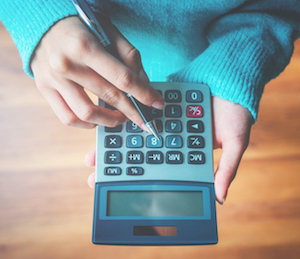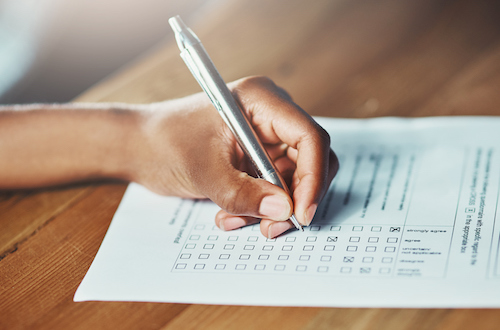Your Home-Hunting Checklist: What to Look for in a Starter Home
You’ve decided that it’s time to buy a home. Maybe you’re tired of renting, you’ve found a permanent job, or you and your partner want to move into a new home together. A starter home can help you gain equity and get you on the right path to your dream home. Or maybe your starter home is your dream home. In either case, a starter home-hunting checklist can help you find what you’re looking for.
Your Starter Home-Hunting Checklist: What to Look For
When you first start looking for homes, it’s easy to get overwhelmed. You’ve probablystarted your search online, and you’ve found dozens of beautiful photos from homes all across the area. How can you narrow it down? Let’s create your starter home-hunting checklist.
Get Your Price Range
 Price sits at the top of your starter home home-hunting checklist because it will help you narrow down your search the most. And, while you might be able to give a little on some other aspects of your checklist, price will be a hard line. It’s also easy to set price restrictions as you hunt for homes.
Price sits at the top of your starter home home-hunting checklist because it will help you narrow down your search the most. And, while you might be able to give a little on some other aspects of your checklist, price will be a hard line. It’s also easy to set price restrictions as you hunt for homes.
How to Estimate Your Mortgage Amount
When it comes to buying a home, there are two aspects of price; the loan you can qualify for and what you can comfortably pay. These two things might not be the same. Calculate your current monthly expenses and estimate any loans you might have in the future, such as a new vehicle or student loans. Then, add how much you’d like to save for other things, such as an emergency fund or retirement. Finally, estimate your leisure expenses. If you know scrimping and following a very tight budget adds a lot of stress to your life, it probably won’t be sustainable long-term, so give yourself extra leeway. Once you know how much you can comfortably pay each month in a home loan, you’ll have a starting point forcalculating your mortgage amount..
Try not to go over your estimated mortgage amount as you hunt for homes. Be patient, check often, work with an experienced realtor, and you’ll find home a home that checks all the major boxes on your starter home-hunting checklist.
Find Your Ideal Location
Narrowing your search by location will also help you hone in on your perfect home fast. To narrow your location, answer these questions:
- What do you want to be close to? Do you want tobe able to walk to to restaurants, coffee shops, or other
 businesses? Or would you prefer a home in the suburbs, or even a home in a rural location? Picture your lifestyle and how you enjoy spending your time.
businesses? Or would you prefer a home in the suburbs, or even a home in a rural location? Picture your lifestyle and how you enjoy spending your time. - Do school districts play a role? Do you picture yourself having children in your starter home? Or do you have children currently? Take a closer look at the schools in your area.
- What are the neighborhoods like? Take a walk around neighborhoods you’re considering. Do you feel welcome and safe?
- What type of home are you looking for? Most neighborhoods have some cohesion, including the age of the homes, the sizes, and their styles. It might be harder to find a very large home in an urban area, and a quaint, smaller home in a suburban neighborhood.
Estimate Renovations and Repairs
The next important item on your starter home-hunting checklist is what renovations or repairs you’re willing to make. You’ll probably find homes that are within your price range and are much larger than others, though they might need some work. In some cases, this can help you build equity and buy into a great neighborhood with great schools. In other cases, you can accrue a long list of expenses and stressful projects you’re not ready to take on.
Consider Time, Money, Skills and Stress
If you know beforehand what you are and aren’t willing to take on, you’ll be able to tell what renovations are outside of your skillset or price range. This way, you’ll be able to make a decision when youview the house. Consider the following:
- Minor repairs: These are things you can do yourself in a day, over a weekend, or gradually over time, if you have the time. This includes painting, minor plumbing leaks, yard work, or deep cleaning.
- Larger repairs: You might be able to tackle these things yourself, but it will be challenging. Unless you have prior experience, you should probably call an expert. This includes installing new flooring, larger plumbing repairs, electrical work, installing appliances or installing insulation.
- Major repairs: Taking on these projects without prior experience will not end well. You’ll need an expert, and these projects can be expensive. This includes home additions, adding or removing walls, repairing or installing a new roof, installing or repairing heating or cooling systems, rewiring a room or installing new plumbing.
When considering how much you’re prepared to take on, consider your income, time, skills and stress tolerance. You’ll need all four to make even minor repairs or renovations yourself. As the repairs or renovations become bigger projects, you’ll need either more income to hire a professional or more time and skills to do the projects yourself.
Picture Your Bedrooms and Space Needs
The next thing you’ll want to consider is how big you want your home to be. How many bedrooms should your home have? How much square footage are you looking for?
Maybe you already have answers to these questions. If you’re unsure, consider the lifestyle you want in your new home. Do you crave an office or hobby room? If you plan on having children, how many? Do you often have friends over? Do you love cooking and baking? All of these questions will help you visualize your home.
Use Your Current Living Space
To answer questions about space, consider your current living space. Is your bedroom and living room big enough? How about your kitchen? How much additional space or rooms would you need to be comfortable? Should your kitchen be twice as large, with twice as much storage space, or maybe 50% bigger? Do you need one additional room just for your working space, or would you prefer an office and a hobby room?
With these questions answered, see how this matches up with your budget. If you can picture yourself living comfortably in a smaller home, maybe you can lower your payment. Or, if the home you visualize is outside of your budget, how can you make some changes? Maybe you could use a basement or garage as a hobby space instead of another bedroom. Or maybe your children could share a bedroom.
By asking a few important questions and visualizing your lifestyle, you can get a better picture of your starter home. Write down your starter-home checklist and stick to it. Remember that your home hunting checklist is supposed to narrow down your options, so it might take some time to find what you’re looking for.


